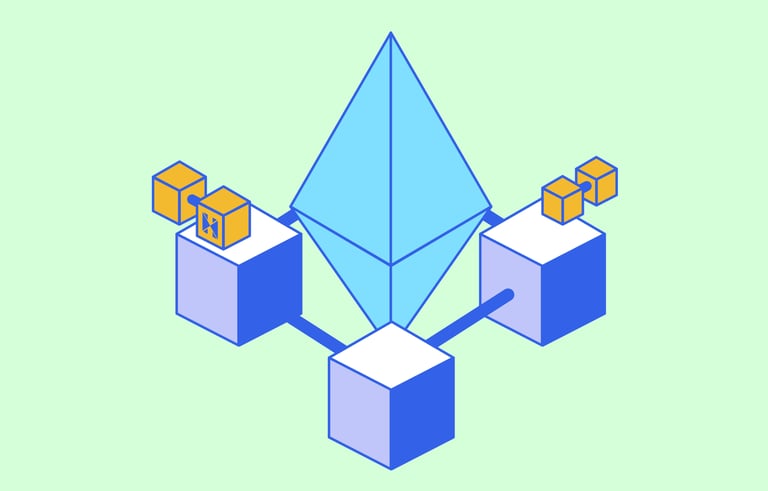All You Need To Know About Ethereum Staking
What is Ethereum Staking?
Ethereum staking allows people to lock up tokens to check transactions and earn money.
Ethereum staking means validating transactions on the Ethereum blockchain network by locking up Ether (ETH), the platform's native cryptocurrency. This allows users to qualify for validator privileges, helping to secure the network and earn rewards. It's like putting your money in a savings account and getting interest in return.
Ethereum uses a system called Proof of Stake to verify and secure transactions on its blockchain. Instead of miners, it relies on people who already own Ethereum coins to help with this process.
When you stake your Ethereum, you're essentially putting it aside for a while to help validate transactions on the network. The more Ethereum you stake and the longer you hold onto it, the better your chances of being chosen to validate the next block of transactions. If you're selected and everything checks out, you'll earn rewards for your efforts.
In simple terms, by staking your Ethereum, you're helping to make the network more secure, and you get rewarded for it. However, if you try anything shady, you could lose some of your staked Ethereum as a penalty.
Benefits of staking Ethereum
1. Easy : Enrolling takes just a few clicks, making it simple. You have the opportunity to earn Ethereum rewards with as little as $1.
2. Secure: We put safeguards in place to minimize risks and give you the freedom to opt out whenever you choose. In some cases, you may need to wait until the unstaking process is done before you can transfer or sell your assets.
3. Passive Income: Staking offers a way to make your Ethereum productive by earning rewards instead of letting it gather dust in your crypto wallet.
How to Stake Ethereum?
There are five methods available for staking Ethereum:
Being a validator directly on the blockchain,
Utilizing Staking-as-a-service,
Joining ETH staking pools,
Staking with an exchange, and
Using liquid staking.
1. Staking ETH as a Validator
To stake Ethereum on the blockchain as a validator, you need to deposit at least 32 ETH tokens. You'll also need a powerful computer that's always online. Being an ETH validator is complex, so do your research before diving in.
Although it's a great way to earn rewards, there are risks. For instance, you can't take out your staked ETH until later, and if the blockchain removes your stake, you could lose them.
2. Staking-as-a-Service (SaaS)
This method also requires locking up at least 32 ETH tokens. Instead of validating transactions yourself, you can let a third party do it for you and still get paid.
To reduce the risk, the Ethereum network gives you separate keys for signing transactions, keeping your private keys safe.
3. Joining a Staking Pool
If you don't have enough tokens to stake on your own, you can join a staking pool with other people and split the rewards. Many pools have low entry barriers.
Remember, staking pools aren't part of the Ethereum network, so research the rules and risks before joining.
4. Staking With an Exchange
You can stake your ETH tokens on major exchanges for convenience. Just be aware that when your funds are on an exchange, they're not entirely yours.
5. Liquid Staking
Liquid staking lets you stake ETH without locking up your tokens. You deposit ETH and get receipt tokens in return, which you can use. When the upgrade is done, and your tokens are released, you can swap receipt tokens back to ETH.
FAQ:
1. Is it possible to unstake ETH at any time?
Staking allows you to earn cryptocurrency rewards while contributing to the security of the blockchain network. You have the flexibility to unstake your cryptocurrency whenever you choose, and it remains under your ownership at all times.
2. Can staked coins still increase in value?
Yes, when you stake your tokens, their value can go up or down. Staking is risky because it often involves locking in your funds for a while, and if the token's value drops, you can't do anything about it.
3. How long does it take for Ethereum staking to start earning rewards?
When you stake Ethereum, the newly staked ETH goes through a bonding period, which can last up to several weeks. However, in most cases, this period is shorter, often just a couple of hours, depending on network conditions, before you can start earning ETH rewards.
DISCLAIMER & WARNING
The information provided here is presented "as is'' and is intended for general informational and educational purposes only. It does not come with any representation or warranty of any kind. This content should not be interpreted as financial, legal, or other professional advice, and it is not intended to endorse or recommend the purchase of any specific product or service. It is advisable to consult with appropriate professional advisors for personalised guidance. In cases where the article is contributed by a third-party author, please note that the expressed views belong to the author alone and may not necessarily reflect the opinions of Hata. For furthedetails, we encourage you to read our complete disclaimer. Please be aware that the prices of digital assets can be highly volatile. The value of your investment may increase or decrease, and there is a risk that you may not recover the full amount invested. You are solely responsible for making your own investment decisions, and Hata cannot be held liable for any losses you may incur. This material is not to be construed as financial, legal, or other professional advice. For more information, please refer to Hata’s Terms of Use and Risk Warning.


